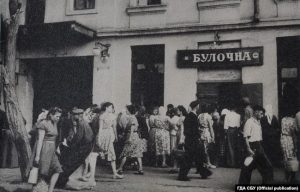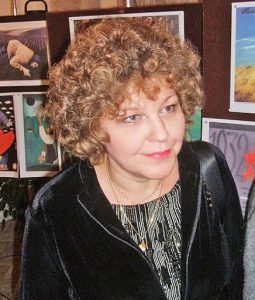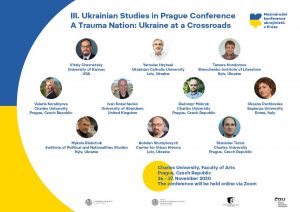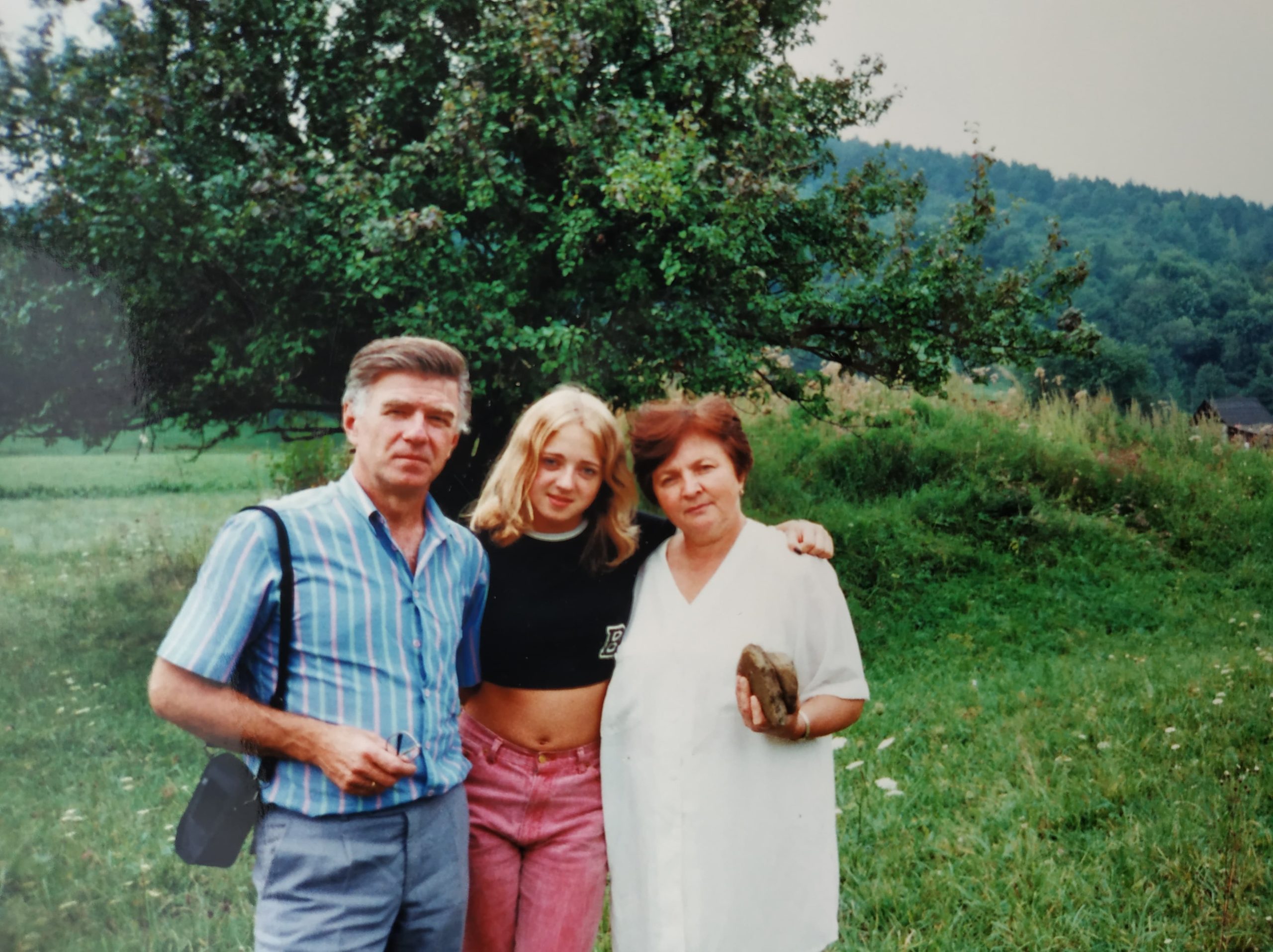Ukraine is gradually learning to discuss its history, analyze traumatic historical events, understand the consequences of colonialialism, and look for ways to overcome them. Yaroslav Hrytsak, Tamara Hundorova, Mykola Riabchuk and other prominent Ukrainian scholars from different countries - Italy, the United States, Ukraine and the United Kingdom - took a part in the two-day online conference A Trauma Nation: Ukraine at a Crossroads, organized by the Institute of East European Studies at Charles University in Prague.
Oxford professor Anthony Smith claimed that historical trauma and memories of collective suffering enable a heterogeneous population to build a nation.
It has taken almost 30 years for Ukraine to begin discussing and understanding the consequences of continuous wars and repressions, of four genocides in little over a decade (1932-1944), of post-war cultural degradation, the Chornobyl accident, and the suppression of free thought until the complete collapse of the Soviet regime.
Letting go of history and overcoming the victim mindset

According to Lviv historian Yaroslav Hrytsak, Ukraine’s path to becoming a modern nation has been complicated by complicated historical baggage:
- the country’s cultural roots are deeply rooted in Eastern Christianity;
- its institutions were established by a backward Russian empire;
- and its development has long been hampered by communism.
However, Hrytsak says that this does not mean that Ukraine’s turbulent history condemns the country to an inexorable fate:
- the so-called great “divide” between western and eastern Ukraine is gradually being erased;
- fewer people look to the past; the younger generation wants to stand on its own two feet;
- young people rely more on their own skills and efforts rather than on state support.
All these factors and more enable Ukrainians to look forward rather than relive the traumas of the past and endlessly pick at the wounds of history.
This is a great opportunity for Ukraine, says professor Hrytsak. But, Ukrainians have become disenchanted with the young politicians of the Servant of the People and Holos parties, who were expected to rise up and address certain challenges.
In fact, it seems that Ukrainians are not yet ready to seize this opportunity and there is a looming danger that they may turn their back on social development and return to the dark days of conflict between old political elites.
According to Yaroslav Hrytsak, the demand for modernization is now stronger in neighbouring Belarus, where events show that the entire Eastern European region is on the verge of change.

Kharkiv researcher Valeria Korablyova, who now works at the Institute of Eastern European Studies in Prague and co-organized the conference, spoke about ways to overcome historical traumas that have prevented Ukrainian society from achieving modernity.
However, it deprives Ukrainian society of subjectivity. The blame for what is happening always lies with someone else (mostly Russia), and moreover, someone else will save Ukraine, and help the country out of this difficult situation (usually the European Union, or the West in general).
According to Korablyova, Ukraine will be able to move forward after the majority of Ukrainians realize that the future lies in their hands only, and that they, and only they, bear complete responsibility for their country.
Tamara Hundorova, a leading Ukrainian literary scholar from the Shevchenko Institute of Literature of the Academy of Sciences of Ukraine, spoke about how Ukrainian literature learned to deal with the trauma of the 1986 Chornobyl disaster. The tragic accident that took the lives and crippled the lives of so many Ukrainians also became a powerful stimulant to the development of Ukrainian literature and pushed it into the postmodern world.
The Chornobyl tragedy gave a voice to the Sixtiers (intellectuals born in the 1950s-60s-Ed), who introduced into public discourse the concept of “spiritual Chornobyl” as a symbol of a catastrophe that spread to many other aspects of Ukrainian life at that time - language, culture, ecology and social values.
Stories from Odesa and Kharkiv – a palimpsest of continuous historical traumas
An interesting look at what is happening in the field of historical memory at the local level was presented by two Ukrainian researchers currently working at foreign universities - Vitaliy Chernetsky from Odesa, currently at the University of Kansas in the US and Ivan Kozachenko from Kharkiv, currently at the University of Aberdeen in Scotland.
They discussed the history and politics of memory in Odesa and Kharkiv, decommunization in the early 1990s in both million cities, and conflicts that arose later around historical memory and monuments, namely when Ukrainians began to think about their vector of development, and politicians began using the traumas of the past more widely.

Vitaliy Chernetsky began his lecture with a personal story. Looking through the Odesa press, he came across the ancestral name of his German immigrant family, who were executed during the repressions of 1937 and buried in a mass grave near Odesa.
Many such graves have been discovered in Ukraine since then, and the fate of these people remains largely unknown, even to the family, and sadly, in a place where tens of thousands of people are buried, there is neither a monument nor a memorial symbol, except for a cross on which the descendant of a repressed Polish family hung a Polish ribbon.
Chernetsky says that his family history is typical of the Odesa region. Two members of his grandfathers’ families were “dekulakized” (dispossessed of all personal material and property-Ed), three survived the Holodomor, but other family members died, and his maternal grandmother perished in a Kolyma Gulag camp (region located in the Russian Far East-Ed).
In the first days of the German occupation of Odesa, the first husband of one of Chernetsky’s grandmothers died in the Holocaust. Another grandmother managed to save her husband from a POW camp by moving from the Romanian occupation zone to Germany. Post-war life was also very difficult for the family: his grandmother’s brother was sentenced to Kolyma in the 1950s.
Chernetsky says that Odesa is definitely part of Ukrainian history and in no way was his family unique. These stories are typical for all Ukrainian families in the 20th
century.

However, the Russian media imposes a completely different image of Odesa. It shows a city of Russian-speaking culture and petty Jewish thieves, portrayed as such in Russian TV series. In addition, this image is widely spread by Odesa tourist companies, because it brings in money, so Ukrainians and tourists are repeatedly fed such stereotypes about the city.
“Unfortunately, some Western scholars are also guilty of spreading these stereotypes, thus reducing Odesa’s history to simple stories about the Jewish community and petty street crimes, and ignoring the Jewish contribution to the growth and development of the city or the evolution of Jewish religious thought in Odesa,” says Chernetsky.
Thus, not only is the Ukrainian component excluded from the history of the city, but also a significant part of Jewish, German, Italian and Greek historical narratives.
Does this mean that Odesa communities are doomed to compete separately for the preservation of their memory?
According to Chernetsky, Western academia proposes a solution - a dialogue whereby narratives of each group do not deny the experience of other groups, but listen, complement and enrich each other’s memory, thus opening a path to solidarity and cooperation between different social groups.

Unfortunately, the politics of memory in Odesa are more like wars that are deliberately stoked by local politicians. This was especially noticeable during the recent local elections. One example was the proposal of candidate Hennadiy Trukhanov - who was re-elected mayor of Odesa - to rename the Heroes of the Heavenly Hundred Avenue, named after the protesters slain during the Euromaidan Revolution, to Marshal Zhukov Avenue (Soviet general and marshal of the Soviet Union-Ed).
[boxright]
Postcolonial syndrome, or Why do revolutions occur one after another in Ukraine?
[/boxright]Marshal Zhukov’s name also played a significant role in the political battles in Kharkiv, says Ivan Kozachenko of the University of Aberdeen.
Kharkiv was the first capital of the Ukrainian Soviet Socialist Republic, from December 1919 to January 1934, and this left a strong imprint on the city’s ambitions and in its collective memory. Kharkiv is also part of the Holodomor memory and the Ukrainian Renaissance of the 1920s.
However, these traumatic events are of no interest to local authorities, who are focused on upholding the Soviet myth, which many residents take for granted.
Like in Odesa, the competition for different historical memories is not based on ethnic narratives, but rather on the Soviet Union.
Much of Kharkiv is still experiencing the trauma related to the collapse of the Soviet Union, which they considered their homeland, and many residents do not accept the Ukrainian narrative. This is reflected in the way Kharkiv residents feel about the war in the Donbas. Despite Kharkiv’s proximity to the war zone, many residents try not to notice or talk about the war, says Kozachenko.

Ukraine is European!
The second day of the conference was devoted to literary and cultural studies.
Oksana Pachlovska, professor of Ukrainian Studies at Sapienza University of Rome, prepared a presentation entitled The Destruction of European Ukraine: Imperial and Soviet Strategy for the Alienation of Literature from Society (Concepts, Mechanisms, Results). As Ms Pachlovska was unable to take part in the conference, her work was presented by Tereza Khlaneva, professor of Ukrainian Studies at Charles University in Prague.

Pachlovska states that Ukrainians are now again at a crossroads between Europe and Russia. Interestingly, this new crossroads is taking shape in a new political context, as Ukraine’s western neighbours, including Poland and Hungary, gradually move away from European values. Moreover, Ukraine is being viewed differently – not only as an East European country, but rather as a synthesis of Eastern and Western culture.
At different stages of its history, Western culture was a decisive factor for Ukraine, not only during the era of Kyivan Rus, but also later, when Ukraine was under Lithuanian and Polish rule. It was only much later, under the rule of Tsarist Russia that Ukrainian lands lost all traces of their national distinctiveness and were reorganized into regular Russian provinces.
In the 19th century, Imperial Russia began a systematic deconstruction of European Ukraine, which continued and intensified during the Soviet era. The study of historical texts, especially ecclesiastical ones, which were written in the ancient Ukrainian literary language, became practically impossible, as did any mention of Ukraine’s contacts with Europe.
“Ukraine was not allowed to have its own history,” sums up Oksana Pachlovska. Only with the proclamation of independence in 1991 were Ukrainians able to uncover these ancient texts and Ukraine’s rapport with European culture. But then came the struggle for identity – the Ukrainian national identity, which had just begun to gain momentum, was challenged by pro-Russian forces supporting Russian and Soviet identities from the past.
[boxright]
Orientalism reanimated: colonial thinking in Western analysts’ comments on Ukraine
[/boxright]
Professor Pachlovska argues that Ukraine needs to return to its historical and modern European context by implementing more translations, comparative studies and promoting direct contacts.
Mykola Riabchuk, prominent Ukrainian journalist, political analyst, literary critic, translator and writer, spoke about Ukraine’s colonial heritage in his presentation entitled White Skin, Black Language. Traumatic Experience of Imperial Linguicide.
Drawing on the pioneering work Black Skin, White Masks, a study carried out by Frantz Fanon, French psychiatrist and political philosopher from the French colony of Martinique, Riabchuk found many parallels between the African and Ukrainian experience.
As a black West Indian, Fanon explores the relations between the French colonizers and the inhabitants of their African colonies. He concludes that colonizers are not distinguished for their cultural achievements, but for their military power, and their ability to subdue others by force and impose their views on the colonized.
He demonstrates how the population of a subjugated colony readily adopts colonial habits and manners. Language plays a most important role here, because the native language is more than often associated with backwardness and a sense of inferiority.

Riabchuk states that the colonial relations described by Fanon have much in common with Ukraine in the Russian-Soviet context, where Ukrainians could show their “white-ness” by renouncing their identity and embracing Russian-Soviet identity and ideology, and could even participate in building the Russian-Soviet empire.A postcolonial legacy has persisted in Ukraine long after its liberation from colonial status.
Given that Ukraine today has preserved and even nurtured its former colonial elite, which continues making certain concessions to “the natives”, including a “Potemkin-style Ukrainization”, Riabchuk explains that a postcolonial legacy has persisted in Ukraine long after its liberation from colonial status.
[boxright]
[/boxright]
However, Ukrainians could find a way out of this situation by building and strengthening a strong middle class keen on establishing a law-governed state that would protect its economic and cultural rights.
The participants also discussed issues related to Soviet policy towards Ukraine, in particular Lenin’s national policy and Soviet Ukrainization in the 1920s.
Stanislav Tumis, Czech researcher and director of the Institute for Eastern European Studies raises the question of whether the russification program that followed the quasi-liberal years of the 1920s was imposed or voluntary, whether or not Ukrainians wanted to join the Russian cultural community that they considered “more advanced” than their own.
The discussion on cultural colonialism or anti-colonialism, as illustrated by the younger generation of intellectuals after 1956 - the Sixtiers - was continued by Ukrainian historian Radomyr Mokryk from Charles University in Prague. He maintains that the cultural revival that emerged in the early 1960s grew into a strong dissident and human rights movement.

Bohdan Shumylovych, researcher from the Lviv Centre for Urban History, concluded the conference by explaining “how some social misfits changed the (Ukrainian) world”. He focused on the youth policy of the Communist Party of the USSR and how it failed in Ukraine.
The Kremlin understood the importance of influencing young people through culture, but at the same time young people considered life in the USSR “grey and boring”.
Therefore, when Ukrainian punk bands, in particular the Hadiukiny Brothers, appeared in the 1980s, they were in stark contrast to the pseudo-folklore groups shown on official Ukrainian television, and became the first manifestation of national non-Soviet culture.
Despite their apolitical stance, their music became highly political, as they gave many Ukrainians the first opportunity to express themselves outside official folk culture. These so-called social misfits legalized ordinary non-literary Ukrainian speech, and revealed to many Ukrainians that Ukrainian could also be the language of social protest and an expression of non-Soviet culture.
Ukrainian studies - a strategic discipline

According to Radomyr Mokryk, who was also one of the organizers of the conference, after the surge of interest in Ukraine immediately after the Revolution of Dignity, the occupation of Crimea and the war in the Donbas, the international academic community became more interested in Ukraine, new academic programs were launched and Ukrainian scholars and researchers were invited to different conferences.
Today, the development of Ukrainian studies continues, not only in the Czech Republic, but also in many countries where Ukrainian studies never existed.
“Our Institute for Eastern European Studies has marked Ukrainian studies as one of its priorities. Although very little was realized in 2020 due to quarantine restrictions in Ukraine and the Czech Republic, our cooperation with Ukrainian universities is deepening, new contracts are being prepared, and positions for visiting professors are being opened. Similar conferences - and this is the third one - are part of our general strategy, a consensus that Ukrainian studies should be further developed,” stated Radomyr Mokryk.
Further reading:
- The myth of “historically Russian Crimea”: colonialism, deconstructed
- Orientalism reanimated: colonial thinking in Western analysts’ comments on Ukraine
- Memory wars and other battles
- Ukraine’s open colonial wounds
- Postcolonial syndrome, or Why do revolutions occur one after another in Ukraine?
- Huntington profoundly wrong about Ukraine, Kyiv historian says






